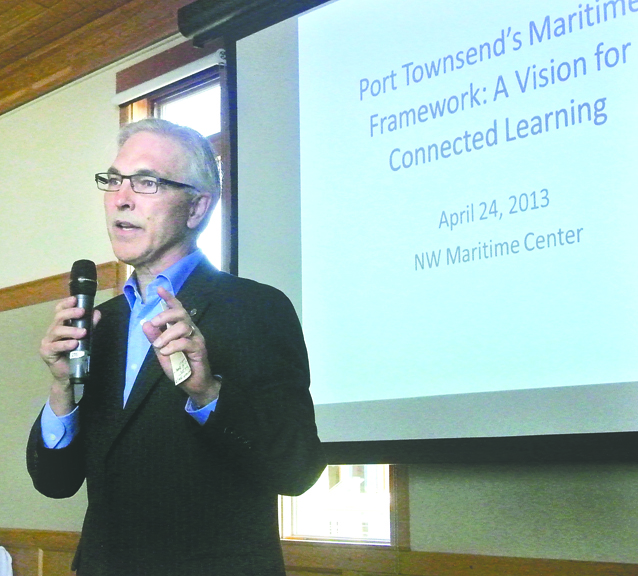PORT TOWNSEND — A plan embraced by the Port Townsend School Board to use the area’s seaside environment in public education was described to an audience of business and community members Wednesday.
School Superintendent David Engle and Northwest Maritime Center Executive Director Jake Beattie talked to about 70 people, tracing the path of the proposal from a theoretical discussion between the two directors to a point where it could change the scope of local education.
“This has gone from a good idea to something that changes the direction of educational policy in just a few months,” Engle said.
“The effects of this program on the school and the community will be absolutely profound.”
The idea is based on a concept of place-based curriculum “that unifies learning along a central focus for a student’s entire school career,” according to a paper Engle has written that can be read at http://tinyurl.com/d9lyq63.
Students would learn subjects in the context of the sea and how knowledge is put into perspective by proximity to the water.
“When people look back over their high school education, they always remember experiential lessons,” Engle said.
“Sadly for many people, this is only one or two events. We want to reverse the ratio of how this happens and spark kids’ imaginations,” he said.
The School Board passed a resolution in support of the plan April 12.
It will be discussed at faculty and staff meetings over the next few weeks as staff members decide how to adapt material into the new format.
Engle expects that such a program would improve the quality of learning and eventually increase test scores.
One possible strategy for incorporating the material would be to design a specific grade’s one-year curriculum into the new format and run it for a year as a test, although that depends on financing, Engle. said
While such a process would require advance planning, Engle expects that some aspect of the format will appear in the instruction during the 2013-2014 school year.
Engle estimates the program will cost about $750,000 over a six-year period, the time it will take to bring the system to full functioning, with $300,000 required over the first three years.
Funding will come through grants and sponsorships from some companies who will benefit from having people well-educated in the maritime trades, Engle said.
Engle does not expect the program to solicit private financial contributions at its beginning, though that could change, he said.
Another step will be to develop a business plan, which Engle said “is unusual for a school district.”
The idea of maritime-based education represents an investment in the community, he said, and will encourage students to develop their interests locally, move away to gain experience, then return to finish their careers.
“This will yield kids who, when they grow into adults, will take care of this community,” Engle said.
“They will go away and then come back to live in this place and take care of it.”
While some students may not initially show interest in maritime-based education, the presentation of material in a relevant context will stimulate their interest, Engle said.
“The way the material is presented will be done in such a way they can see that it applies to them,” Engle said.
“A lot of us when we were learning algebra would ask the teacher how it applied to us and never got a good answer.
“Here, the kids will have an ‘aha!’ moment and know exactly how it applies to them,” he added.
“There is a wonderful audacity in this room,” Beattie said prior to Engle’s presentation.
“If someone had told me when I first came to Port Townsend in 2001 and saw the land where we are now, which had a few rusty buildings, that the location would house a building that would change education, I wouldn’t have believed them,” Beattie said.
“It has turned into a force for positive change.”
Jefferson County Editor Charlie Bermant can be reached at 360-385-2335 or at charlie.bermant@peninsuladailynews.com.

